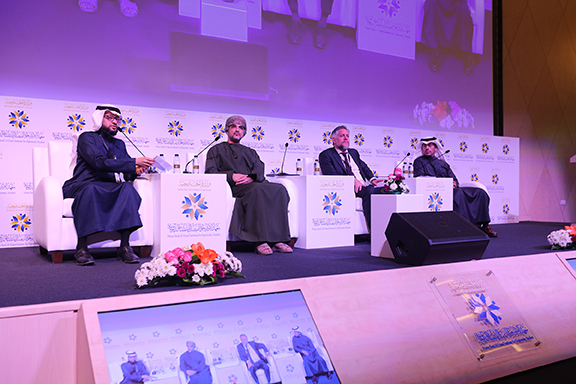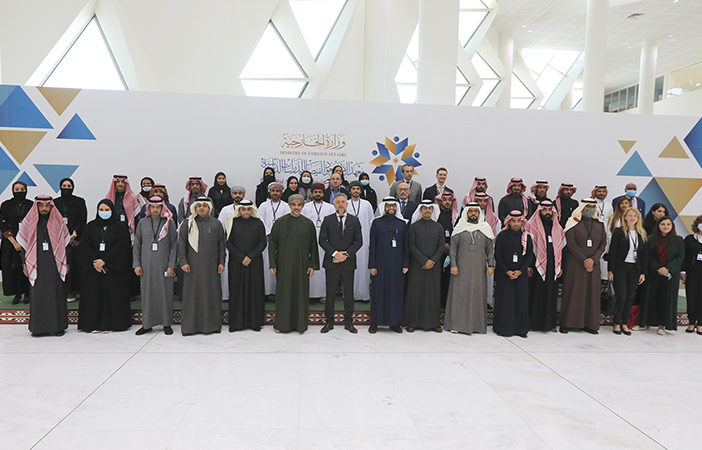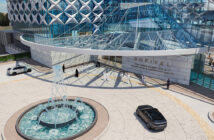Deepening expertise and fostering closer bilateral relations
Since the opening of the European Union (EU) mission in Riyadh (2004), the Delegation has been working on many areas of cooperation between the EU and the Gulf Cooperation Council (GCC). The partnership includes political dialogue, economic and trade matters, regional security, education, climate change, and green economy transition.
In February 2022, to increase its engagement with the Gulf region, a five-day High-Level Training for 35 GCC Diplomats was organized by the EU Delegation to the Kingdom of Saudi Arabia in collaboration with the Kingdom of Bahrain and the Sultanate of Oman. The training aimed to contribute to strengthening the understanding of the European Union’s institutions and decision-making processes, particularly the EU’s external engagement with GCC countries.
The in-depth training was conducted in partnership with the Prince Saud Al-Faisal Institute for Diplomatic Studies (IDS) in Saudi Arabia, the Diplomatic Institute of Oman, and the Mohamed bin Mubarak Al Khalifa Academy of Diplomatic Studies in Bahrain. The training was delivered by the professionals of Clingendael, the Netherlands Institute of International Relations, an independent think tank and academy on international affairs.
The opening ceremony took place on February 13, in the presence of representatives from the Saudi Ministry of Foreign Affairs, HH Sayyid Faisal bin Turki Al Said, Ambassador of Oman to Saudi Arabia, and Mr. Khalifa Ali Muhammed Al Manaseer, Minister Plenipotentiary and Chargé d’Affaires of Bahrain to Saudi Arabia.

In his remarks on the importance of this undertaking, HE Patrick Simonet, the European Union Ambassador to the Kingdom of Saudi Arabia, the Sultanate of Oman, and the Kingdom of Bahrain, said: “This training program demonstrates our joint commitment to advance EU-GCC relations. Our aim is to enhance mutual understanding with our partners in the Gulf region. We believe enhancing understanding about the European Union – a political and economic union that brings together 27 Member States and nearly 500 million citizens – will contribute to this objective.”
HE Ambassador Simonet further emphasized, “I am happy to see that we were able to bring together so many diplomats of the region for this meaningful and interactive engagement.”
Diplomats participated in workshops, interactive exercises, and simulations on political and trade negotiations and energy cooperation. In addition, they have enriched their knowledge on trust, consensus-building, and power dynamics in the European Union.
Ambassador Simonet expressed his gratitude to the Prince Saud Al-Faisal Institute for Diplomatic Studies, the Diplomatic Institute of Oman, the Mohamed bin Mubarak Al Khalifa Academy of Diplomatic Studies in Bahrain, and the Ministries of Foreign Affairs. Representatives of three organizations in their statements valued the initiative that was equally important for the EU, GCC, and diplomats.
Dr. Alomrani, the Acting-Director General of the IDS, has emphasized that diplomatic training simulation programs are among the best training practices for diplomats. “I am confident that this program will help the participants gain a deeper understanding of decision-making processes.”
The closing ceremony took place on February 17 at AlMashtal Creative Space at the Diplomatic Quarter. During the ceremony, the training graduates were awarded completion certificates, followed by a panel discussion on the future of EU-GCC relations and lessons learned through decades of partnership based on mutual respect.
Senior officials from the Saudi Ministry of Foreign Affairs, GCC diplomats, IDS leadership, Ambassadors of the European Member States, and other distinguished guests attended the closing ceremony.




